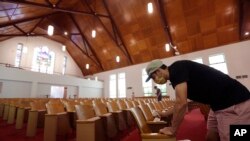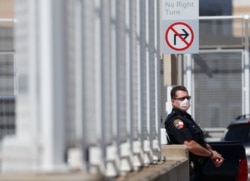European and U.S. health experts are warning of huge steps backwards in the fight against the coronavirus if governments ease lockdowns and other restrictions too soon.
“We’re risking a backslide that will be intolerable,” said Dr. Ian Lipkin of Columbia University in New York.
While a number of states in the U.S. and some European countries are gingerly starting to reopen businesses and public attractions, experts are afraid people will see that as a sign that they can ditch the face masks and ignore social distancing restrictions.
“If we relax these measures without having the proper public health safeguards in place, we can expect many more cases and, unfortunately, more deaths,” said Josh Michaud, associate director of global health policy with the Kaiser Family Foundation in Washington.
Some medical officials say there will be a second wave of coronavirus but cannot predict how severe it will be.
The head of the World Health Organization, Tedros Adhanom Ghebreyesus, said Wednesday that countries may have to go back to lockdowns if they don’t ease them sensibly.
“The risk of returning to lockdown remains very real if countries do not manage the transition extremely carefully and in a phased approach,” he said.
While polls show most Americans favor restrictions aimed at containing the coronavirus, protesters have filled the streets of some state capitals demanding that businesses reopen and lockdowns be lifted.
A judge in Texas has jailed the owner of a Dallas beauty shop for opening her salon early in defiance of the governor’s orders.
A crowd outside her store cheered as Shelley Luther tore up a copy a letter ordering her to keep the doors locked until Friday, when Gov. Gregg Abbott said hair salons can open again.
A judge sentenced her to a week in jail and a $500 fine for every day her parlor stayed open but said he would let her out of jail if she apologized.
So far, Luther has refused, saying she has people working for her who cannot feed their children.
Despite her defiance of his orders, Abbott said Wednesday he does not think Luther should be locked up, saying such a move should only be a last resort.
Meanwhile, the Associated Press reports that Hispanic and African American populations have been hit harder by the virus than most people in the U.S. – not only health-wise but in the pocketbook too.
An AP-University of Chicago survey says 61% of Hispanic Americans report a loss of income compared with 46% of Americans overall, and 27% of black residents say they can’t pay some of their bills, compared with 17% of whites.
According to the AP, lower-income Americans and those without college degrees have taken the brunt of layoffs because of the coronavirus.
“If our policies do not adequately address these shortfalls and the racial disparities in income, wealth, employment and wages, then we’re going to see the same pattern that we have seen historically,” said Valerie Wilson, a director of the Economic Policy Institute, told the AP. “It’s going to take much longer for these families to recover – if they ever recover economically.”
An animal rights group in Thailand is appealing for funds to help elephants in sanctuaries and tourist attractions return to their natural habitats.
The Save the Elephant Foundation said the animals are at risk of starvation because tourists cannot come to Thailand to enjoy them and their keepers cannot afford to feed them.
Another group, World Animal Protection, says as many as 2,000 elephants are at risk.
Elephants eat as much as 300 kilograms of fruit and vegetables every day.
Save the Elephants says it is organizing caravans to take the animals from the sanctuaries in towns and cities back to the homes where they were born.
“These elephants have not had a chance to return home for 20 years,” said Sadudee Serichevee, who owed four elephants. “They seem to be very happy when arriving home, they make their happy noises, they run to the creek near the village and have fun along with our children.”






